- Home
- Jane Smiley
Riding Lessons Page 6
Riding Lessons Read online
Page 6
At lunch, I must have talked on and on about Joan Ariel (not a secret), because Ann and Todd didn’t say anything, and every so often nodded and smiled, and then Todd ran off to play with the boys, and Ann and I went out for after-lunch recess. Instead of sticking with me, she went to some girls in her class, and even though they weren’t mean to me or anything, I felt a little like Ned in the pasture, not very important. But what did I care? I couldn’t stop thinking about Joan Ariel, but I did shut up.
One thing all my report cards say about me is that I am always busy, and if only I wouldn’t get distracted, I would do better in school. It is true that I’m always busy, but I don’t get distracted. I just like to do what I want to do, and only sometimes is that the same thing that the teacher wants me to do. Miss Cranfield is really good about this. If I have done my work for school, then she ignores me when I am doing other things, so in the last week, I had made eleven drawings of Ned’s head. After I finished my multiplication problems, I opened the lid of my desk and looked at them. Of course, I put the day I drew each one on the lower right-hand corner, because it is better to be organized. I closed my eyes and pictured Ned in my mind. The problem was that now that I had seen him more, I wasn’t so sure what he looked like, and I thought that all the pictures were wrong. Sometimes an ear was right and sometimes an eye. The line of his face is straight, so it is easy to get that right. Miss Cranfield said, “Ellen!” She was standing right beside me. I jumped and banged my head on the lid of the desk, and then it dropped and landed on my hand and I said, “Dammit.” About six or seven kids laughed out loud, and Miss Cranfield gave me a dirty look, and then she pointed to my multiplication sheet, which had fallen to the floor and now had a footprint on it—my footprint. I bent down and picked it up. She took it between her thumb and forefinger and said, “Ellen, why don’t you take a break.”
This meant that I had to go out and sit in the hall. It wasn’t me who was taking the break, it was her.
I passed Ruthie Creighton on the way out. She was staring up at me with her mouth open. I also passed Todd, who smiled but then hiccuped.
I don’t mind sitting in the hall. I’ve only done it a couple of times. It’s quiet and cool—there isn’t any sunshine in the hall. Sometimes I make up a story. This time, I imagined Mom and Dad leaving the house all dressed up, and getting into the car. Then I thought about them driving past the school, up the hill, turning onto the highway, and heading to San Jose, out into the sun, past the fields and the mountains in the distance. The windows are down because it is hot, and Mom is holding her hat on, trying to keep her hair out of her face. Dad says, “Joan Ariel will be a wonderful child,” and Mom says, “But not better than Ellen.” Then they both nod.
Miss Cranfield opened the door after a while and said, “Ten minutes are up. You can come back in, Ellen, but I want you to stay after school so that I can talk to you about a few things.”
I said, “Am I in trouble?”
She said, “Not exactly.”
I have to say that I always think it is better if they say “yes” or “no.” It’s like they do not know what they mean. I always know what I mean.
All the other kids picked up their lunch boxes and their sweaters and walked out of the room. I stayed sitting at my desk. Miss Cranfield put some things in drawers, then got up and put the chalk and the erasers at one end of the blackboard. At last, she looked at me and made a little wave with her hand, so I went and stood in front of her desk.
She said, “The first thing I want you to know, Ellen, is that you aren’t in trouble.”
I said, “I know that.”
She acted like she didn’t hear me, and went on, “Sometimes when things get to be just too much, people have to take a break.”
I said, “I didn’t mind taking a break.”
She sighed and said, “Good. Good. I told the class that you weren’t in trouble.”
I said, “I hope they believed you.”
“Well, perhaps they did. Anyway, your mom told Mr. Gretzky what she and your dad are doing today, and he told me. Sometimes big changes can be a little overwhelming, and when they are, children get a little disorganized….” Mr. Gretzky is our principal.
“I wasn’t disorganized. I was organized. I was looking at my horse pictures, and deciding if any of them were good. I was finished with my problems.”
“I saw that you drew a couple of horse pictures on the back of one of your papers.”
“Did you like them?”
“Well, that isn’t really the place for them.”
“That was why I drew them on the back. Did you like them?”
“Ellen, I don’t think it’s a good idea to encourage you.”
“Why not?” I was not trying to be sassy. I really wondered.
Miss Cranfield looked me right in the eye, and the look on her face said two things. One of them was “I don’t know” and the other one was “I am losing my patience here.” It’s really hard to make Miss Cranfield lose her patience. She’s been teaching in our school since my mom was in fifth grade. My mom never had her, because Miss Cranfield started with the first graders, but when we have Open School Night, my mom and Miss Cranfield always give each other a little kiss on the cheek and seem happy to see each other. She doesn’t live in our town, but down the coast.
Finally, she sat back in her chair, stacked her papers together, and gave her biggest sigh. At last, she said, “What I would really like you to do for the rest of the school year, which is only about six weeks at this point, is to practice paying attention and following instructions. You have a lot of practice doing things the way you want to, but very little practice doing things the way you’re supposed to.” She leaned forward. “In order to do well, you have to know how to do it both ways—your way, and someone else’s way—and to know when each way is appropriate. Do you hear me?”
I nodded.
“Okay, you can go.”
I went.
Grandma Lydia was standing on the front porch waiting for me when I got to the house. She said, “Good heavens! It’s nearly three-thirty!”
I told her that I had to stay after school, even though I wasn’t in trouble, and she clucked and shook her head and said, “They could at least call!” but she didn’t sound angry, and I have often heard Mom say, “Why in the world is she such a worrier!” She held the door open for me, and we went into the house. Of course, there was a whole plate full of oatmeal cookies on the kitchen table, still warm, and the kitchen smelled wonderful. Grandma Lydia always says that if she has a minute, she would just like to make something, and so she does, and my favorite thing she makes is the oatmeal cookies, and so the spoiling was continuing. We sat across the table from one another, and she smiled while I ate my cookie and drank a glass of milk.
After I had eaten the last crumb, I said, “Do you remember the day Mom and Dad brought me home from the orphanage?”
“You mean the agency, but of course I do. It was only nine years ago, sweetheart. That’s no time to an old lady.”
I said, “How old are you?”
She laughed. “I’m sixty-five, but don’t you dare tell anyone.”
“So what was it like?”
“Oh, goodness, well, it was foggy, for one thing. That was a foggy summer, it kept coming and going. Your mom so wanted to have a nice day for you, but we could barely see our hands in front of our faces. So, let’s see. You were seven weeks old—”
“Joan Ariel is two weeks old.”
“Oh, goodness, I knew a child, didn’t get out of the home until she was over a year. She was walking and everything! You hope for the best, but you never can predict. Anyway, you were already smiling—that’s the first thing I remember. Your mom kind of leaned over you and had you covered so your face wouldn’t get damp, and then she came in the house here, and folded back the blanket, and
you had such a big smile on your face. Ear to ear. And such thick hair. Just black. That all fell out. Always does. And then it came in like it is now, more brown and shiny. I knew one other baby who was like that—born with thick blond hair, just white-blond, that fell out and came in red.”
“Was I a good baby?”
“Oh, heavens me. Well, you meant to be good, but you were very opinionated. Every time we offered you something, you stared at it as if you had to make up your own mind. You walked at a year. I woke up at night worrying about the stairs, but you taught yourself to go down them, up and down, all day long. It was good exercise. I remember one time your mom had you at the department store, and I guess she bent down to look closely at some dress she was interested in, and when she stood up, you were holding on to the skirt of the dress you liked. It was red.” She put her head back and laughed, then looked at me. “When I was your age, we were told to sit quietly and speak only when spoken to. Isn’t that ridiculous? But that was the way back then. When your grandpa was in school, they would paddle him, and cane him on the hand. He had to hold out his hand, and the teacher would smack it with some kind of flexible cane, make it so it hurt as much as possible. I swear, were people that much stupider back then? Seems to me like they were.”
Now she looked at me. “Well, I guess get out of your school clothes, into something comfortable. We might have a long wait, might not.” She stood up and picked up my dirty glass. I went upstairs. There was nothing new in my room, at least. I went to my window and opened it, and all the fragrances of all the flowers planted around the yard came blowing in. I hadn’t said that I would be good all the time for the next six weeks. I had only said that I heard what Miss Cranfield was saying, so I would not be breaking any promises by not being good. I knew that, even if she did not. But I also had this little feeling, like we were close to some edge—all of us: Mom and Dad because of Joan Ariel, and Grandma because she was baking so many cookies and remembering when she was young, and Miss Cranfield because the end of the year was coming, which in my experience always makes teachers nervous, and maybe that is because some kids have to be flunked and some kids have to be sent to the principal’s office. Which is not to say that edges are all bad. You can get to the edge of the high dive at the swimming pool and then jump off and it feels wonderful and you want to do it again and again. But it still feels like an edge.
A voice said, “Knock knock!” and I said, “Who’s there?” and the voice said, “Ned!”
Mostly, I talked to Ned at night, when I was lying in the dark. I had to be lying on my back, too, and kind of looking at the ceiling. Now I laughed to myself, leaned my elbows on the windowsill, and closed my eyes.
He said, “He’s here.”
I said, “Who’s there?”
“My friend.”
“Your friend from a long time ago?”
“Yes. We knew each other as soon as he stepped off the trailer. He whinnied. I couldn’t see him, but I heard him. I knew it was him, and then they walked him around the house and along the fence, and I whinnied, and he looked at me. They call him Ben.”
“Ben and Ned?”
“That’s who we are, at least here.”
“Does he still look like you?”
“He’s bigger, a little longer in the leg. Maybe humans wouldn’t think we look alike, but to us we do.”
I opened my eyes and thought for a while about whether I should ask my next question. There were two little birds across the way, building their nest in one of the trees. I watched them for a moment, then said, “Is he nice to you?”
“We touched noses and sniffed each other. We played a little. He’s standing right here.”
But I didn’t see him. I said, “Will he talk to me?”
“No. He doesn’t know how.”
I said, “What has he been doing?”
“He never went to the track. He hurt himself at the training farm, then was out for a year.”
I said, “What does Gee Whiz have to say?”
“He just kicked up and walked away.”
Just then, I heard a car in the driveway, and I knew that Mom and Dad and Joan Ariel had arrived, and I have to say that Ned went right out of my head at that very moment. I didn’t even change my clothes, the way Grandma had told me to. I went out in the hall. I thought I was going to run down the stairs, but then the front door opened—I could see it from the landing—and all of a sudden, I felt afraid, though I have no idea what I was afraid of. I stood there with my hand on the banister. Dad must have been holding the door open—he does that—and here came Mom, and she had a bundle in her arms wrapped in pink blankets. Dad came in right after her, and Grandma was there, saying, “Oh my, look at that!” and when everyone got quiet, I could hear this little sound, not crying, but this meeping, cheeping sound. Mom looked up the stairs and said, “Sweetie, come down!” And so I went down, step by step. I watched my feet, which I haven’t had to do since I was five years old and learning to go down the right way rather than one foot at a time. It was like that edge I had been thinking about. Here it was. Joan Ariel suddenly seemed very scary. My heart was pounding, too. I could feel it. I decided that I would be a good girl, maybe not for six whole weeks, but at least for now.
When I got to the bottom of the stairs, Dad took my hand and gave me a kiss and then Mom leaned down and there was Joan Ariel, all wrapped up, only her face showing, and I have to admit that I had never seen anything like her in my whole life, so tiny and reddish and with her eyes kind of crossed, not like any picture of a baby, or any baby in the movies or on TV that you ever saw, and it did occur to me that maybe we got her because no one else wanted her, but I didn’t say it—even I knew better than to say that—and I kissed her on the cheek, and Mom said, “Just don’t kiss her on the lips,” but I wouldn’t have done that anyway.
Mom carried her over to the couch, sat down, and laid Joan Ariel down beside her and opened up the blanket. Mom was smiling like it was Christmas. The meeping and cheeping got louder when the blanket was opened, and in the meantime, Grandma went into the kitchen and returned with a baby bottle. She gave it to Mom, then settled back on her heels with her hands on her hips, also smiling like mad, and I guess that’s when my new life began.
Apparently, it takes two people to take care of a baby, because Grandma Lydia stayed that evening and made supper. Grandpa came over, too, to have a look at Joan Ariel. The next morning, Grandma showed up before I even came down for breakfast—and she made me pancakes. Dad was already gone on his vacuum-cleaner trip for the week—he had to rush down to Los Angeles, which is a long drive, and then get in lots of showings, because Mom did in fact quit her job at the department store, at least for the time being. Grandma kissed me way before I left for school, and went upstairs, and I got myself dressed and out the door, and it is certainly a good thing that I wear a watch and know what time it is. There are kids in my class who still can’t tell time, if you can believe it, or at least they pretend that they can’t. We had stewed tomatoes at lunch, and a bunch of sixth graders sang a song: “Stewed tomatoes, together we’ve hated you! Of course, that is nothing new—we hate cabbage, too. All hate! All hate! The tomatoes that Johnny ate!” Johnny must have been Johnny Cain, because he then stood up at the end of his table, and pretended to throw up on his plate, and everyone laughed, and Mr. Nelson, the sixth-grade teacher, walked him out of the lunchroom.
By the end of the day, I felt like I had been at school for my whole life, even though I knew this wasn’t true.
And maybe the fact that I was now supposed to pay attention in class every minute and do everything that I was told to do was part of the problem, because I knew that Miss Cranfield was watching me, so I didn’t even look at the alphabet or keep track of saying it backward to myself, nor did I look out the window, nor did I say anything to Ned, nor did I draw a horse or even a tic-tac-toe on my paper. One thing
I did do was erase a bunch of answers to questions on the spelling test, and then on the multiplication paper, and write them in again more neatly—not because the answers were wrong but because I was so bored—and then I looked over at this girl in our class who is always number one, Kathleen Kernan. I know that she does the same thing, because I’ve seen her do it, and I realized that she must be bored all the time. That is the only possible reason for wanting to make every number and letter you write down perfect. The only thing I liked was reading the last chapter of The Borrowers and voting for our next book, which is Johnny Tremain, not The Black Stallion, but even though I made a face, I did not say anything.
After school, I tried something. That was to go out of the school not by the front door—which is the door I usually use, since you can go out the front door and walk down the street and there you are at my house and you can look at the bay in the distance the whole time—but by the door that goes to the playground. A lot of kids leave that way, and then cut across the playground to get home. One of these is Ruthie Creighton. I took some time putting my things away (still, you might say, doing what I was supposed to extra well), and then I walked slowly out of our room, and just followed all those kids. No one noticed me—I mean, Marilyn Cooper asked me if I had liked The Borrowers, because her mom gave her a copy for her birthday, and Paulie Miller told me he was getting a puppy, but mostly I pretended I was doing what I always do, acting like I had to go to the market (where I was allowed to go, but only if I told someone I was going), and it didn’t take too long for me to just be walking along by myself, maybe half a block behind Ruthie, who was dragging her jacket along the sidewalk and sniffling like she didn’t have a tissue. I saw where she went into her house—it was a yellow house with a steep outside staircase. She went up and opened the door at the top. I waited a little while longer, but she didn’t come out. I didn’t see a yard or any kids in the street. I got home by a quarter to four, according to my watch, but no one said anything when I came in the house—Grandma was rocking Joan Ariel to sleep in our rocking chair (she put her finger to her lips) and Mom was upstairs taking a shower. Grandma made dinner again that night, and Grandpa came over, and we had spaghetti and meatballs.

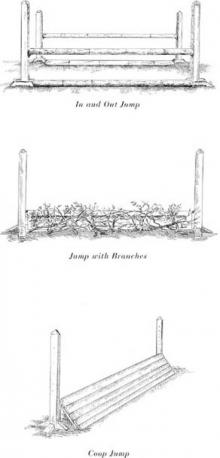 The Georges and the Jewels
The Georges and the Jewels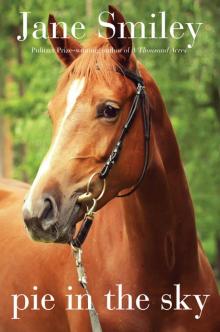 Pie in the Sky: Book Four of the Horses of Oak Valley Ranch
Pie in the Sky: Book Four of the Horses of Oak Valley Ranch Duplicate Keys
Duplicate Keys Charles Dickens
Charles Dickens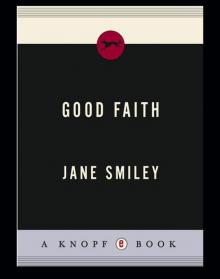 Good Faith
Good Faith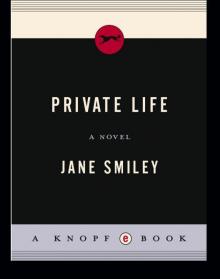 Private Life
Private Life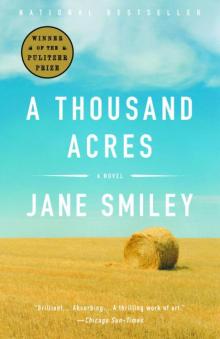 A Thousand Acres: A Novel
A Thousand Acres: A Novel The Greenlanders
The Greenlanders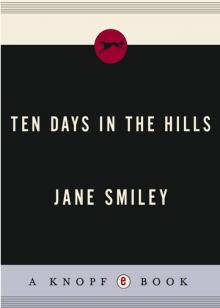 Ten Days in the Hills
Ten Days in the Hills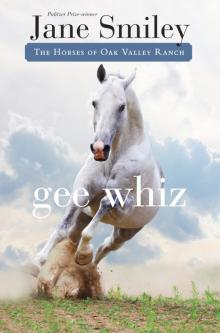 Gee Whiz: Book Five of the Horses of Oak Valley Ranch
Gee Whiz: Book Five of the Horses of Oak Valley Ranch A Thousand Acres
A Thousand Acres The All-True Travels and Adventures of Lidie Newton
The All-True Travels and Adventures of Lidie Newton Ordinary Love and Good Will
Ordinary Love and Good Will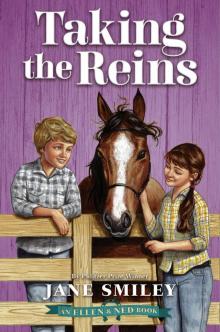 Taking the Reins (An Ellen & Ned Book)
Taking the Reins (An Ellen & Ned Book) The Man Who Invented the Computer
The Man Who Invented the Computer Horse Heaven
Horse Heaven The Age of Grief
The Age of Grief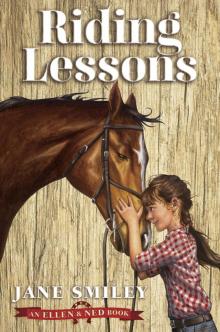 Riding Lessons
Riding Lessons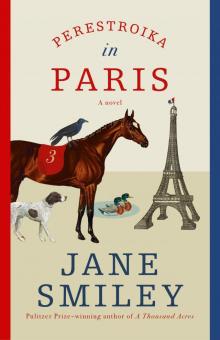 Perestroika in Paris
Perestroika in Paris A Good Horse: Book Two of the Horses of Oak Valley Ranch
A Good Horse: Book Two of the Horses of Oak Valley Ranch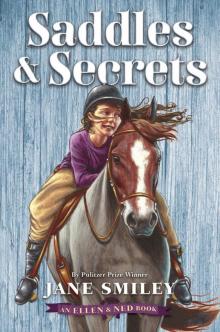 Saddles & Secrets (An Ellen & Ned Book)
Saddles & Secrets (An Ellen & Ned Book)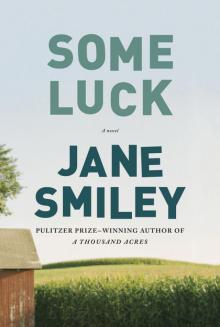 Some Luck: A Novel
Some Luck: A Novel Champion Horse
Champion Horse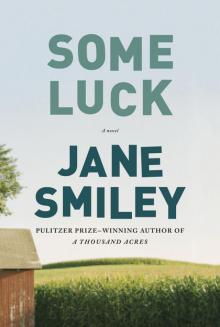 Some Luck
Some Luck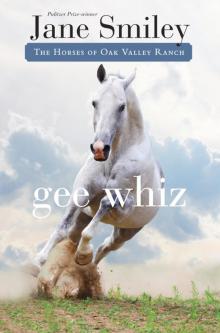 Gee Whiz
Gee Whiz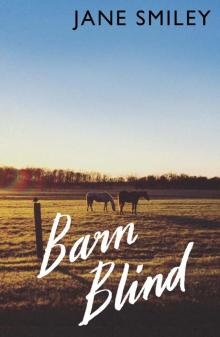 Barn Blind
Barn Blind A Thousand Acres (1992 Pulitzer Prize)
A Thousand Acres (1992 Pulitzer Prize)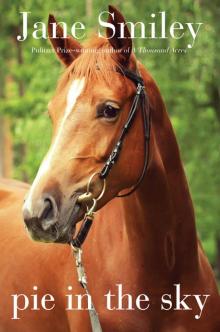 Pie in the Sky
Pie in the Sky True Blue
True Blue A Thousand Acres_A Novel
A Thousand Acres_A Novel A Good Horse
A Good Horse